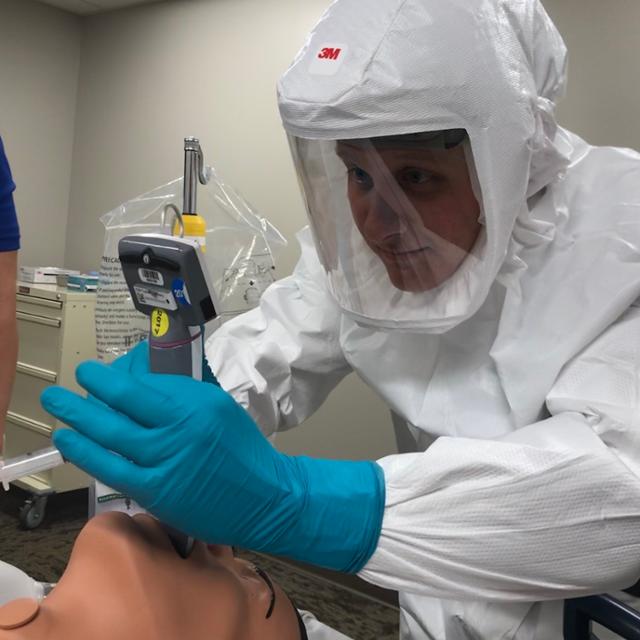
Nurse Anesthesia Student Leads COVID-19 Response Team
Justin Hawker ’16 was prepared for such a time as this. The TCU nurse anesthesia student possesses a background that earned him myriad experiences, and they culminated to allow him to lead in unique service during the onset of the COVID-19 outbreak.
Hawker, also an alumnus of the TCU nursing undergraduate program, was working as an ICU nurse at JPS Hospital. In his earlier life, however, he was a sailor in the U.S. Navy, where he was extensively trained in guarding against chemical, biological, radiological and nuclear warfare. Stationed in Hawaii, he was charged with protecting a Naval ship during such a circumstance in the early 2000s.
“Because of the time, with terrorism and everything going on, people were particularly focused on threats like anthrax and other chemical and biological agents,” he said. “Before I transitioned out [of the Navy], we also had an incident of swine flu on the ship that had to be contained.”
These events would set him up to assist his hometown’s county hospital during a global pandemic.
“I’m a nerd,” Hawker said. Even after exiting the service, he said he was always reading and staying up to speed. The military had honed his natural leadership and training tendencies. In 2018, when the Federal Emergency Management Administration hosted a disaster preparedness class titled Barrier Precautions and Controls for Highly Infectious Diseases, he was quick to raise his hand.
His proficiency was noted by the Centers for Disease Control and Prevention, and he participated in a simulated disaster training that staged a Ground Zero hospital for more than 500 patients following a manufactured Ebola outbreak.
Two years later, Hawker would be doing the training, and the disaster wouldn’t be simulated. While nursing at John Peter Smith Hospital, he was getting ready to part from his nursing hours to focus on family issues and the intensity of his nurse anesthesia training just when COVID-19 was emerging in America.
“They needed subject matter experts to train people on how to respond,” he said. “The hospital asked me to stay on and train and prepare the staff on biological containment, equipment procedures, supply chain and logistics management and help cross-train the other departments.”
The emphasis was on preparing physicians, nurses and respiratory therapists on the proper use of equipment, troubleshooting equipment malfunctions, containment breeches and performing high-risk procedures with the additional stress layer of personal protective equipment.
Just as his training in the Navy and at JPS prepared him well for this event, he also points to a time at TCU that brought much of his knowledge together.
“I had a public health class with Gina Alexander [associate professor of nursing], and it really helped me focus on the macro side of things,” he said. “As a nurse, especially an ICU nurse, we focus on the micro all the time.”
But, seeing the broader picture of public health play out with his intensive care training provided an ideal lens to lead and train the hospital Special Infections Response Team, where he attended every patient under investigation for COVID-19 who came into the Critical Care Department. Preparing for his eventual departure, he trained a team to continue the program and produce a self-sustaining unit within the hospital. He was happy to answer the call.
“TCU shaped who I am as a nurse,” Hawker said. “The culture at TCU taught me to focus on doing the best I can for the community around me.”
